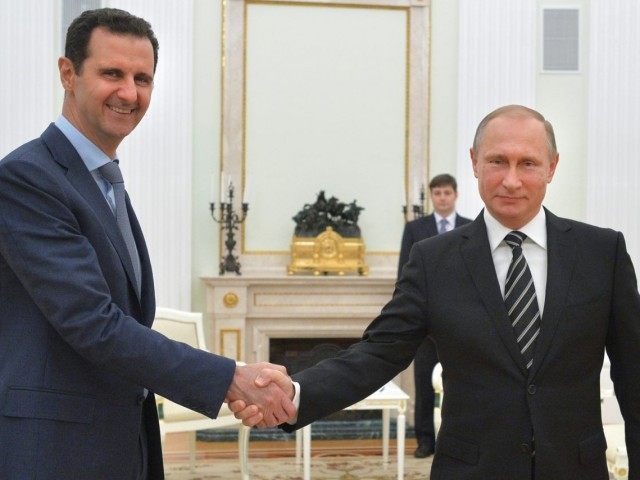WASHINGTON, DC — A former top Pentagon official who served under U.S. President Barack Obama told House lawmakers on Thursday that the former American president began talks with Russia over Syria in part out of concern that the murderous Bashar al-Assad regime may soon fall, noting that, at the time, the United States deemed that scenario a “catastrophic success.”
Andrew Exum, who served as the deputy assistant secretary of defense for Middle East Policy under Obama, made the revelation in written testimony prepared for a House Foreign Affairs Subcommittee on the Middle East and North Africa hearing.
Exum suggested that Obama cooperated with Russia to prevent Assad falling too quickly to stop the country from collapsing into lawlessness, a potential repeat of the regime change that took place in Libya in 2011. Libya is still reeling from the U.S.- and NATO-backed removal and subsequent execution of dictator Muammar Qaddafi in 2011.
In 2014, Obama approved the deployment of American forces to combat the Islamic State (ISIS/ISIL) in Iraq and Syria.
Exum testified:
You might be questioning the wisdom of talking to Russia about Syria in the first place, and if you are, you would have found good company within certain departments and agencies in the U.S. government during the Obama Administration. Engaging in talks with Russia over Syria was not a universally popular thing to do at the time, was the subject of intense debate among both career professionals and political appointees such as myself, and it’s fair to say that my own department was not completely supportive of the talks but – when directed by the president – supported them to our greatest ability. It’s probably worth winding the clock back, then, to explain how and why we began talking to the Russians.
It all started in the summer of 2015, when my office … began coordinating interagency planning for a scenario in Syria we deemed “catastrophic success.”
After years in which the Assad Regime had struggled to defeat a persistent insurgency and in which the Islamic State had assumed control of most of eastern Syria and had begun to also threaten Syria’s main cities in the West, we worried that the Assad Regime might finally collapse – and do so quickly, in a way that would endanger U.S. interests, to include the security of the state of Israel.
It’s fair to conclude that if we, sitting as we were in a five-sided concrete box in Washington, were worrying the Assad Regime might suddenly collapse, the Russians and Iranians – sitting much closer to the situation – were likewise worried.
Exum, who now works for the British private intelligence firm Hakluyt & Company, acknowledged that Assad “won the war” in Syria.
Referring to Assad’s allies Iran and narco-terrorist proxy Hezbollah, he added:
Russia may have been captive to the whims of its coalition partners at times, but Russia and its coalition partners also won, so Russia can share in that victory. We cared about our own priorities, and as a consequence, we both helped secure Israel and defeated the Islamic State [ISIS/ISIL].
The ISIS caliphate did not wholly fall until March of this year, under President Donald Trump. U.S. military and intelligence officials, however, have conceded that the terrorist group remains a threat in Iraq, Syria, and beyond.
Exum also identified the need to establish communication channels to prevent any conflicts between the American and Russian troops who were operating nearby in Syria as another reason for talking to Moscow.
The former Pentagon official noted the Obama administration declined opportunities “to jointly target suspected terrorist cells with the Russians.”
He said the prospect “gave everyone in my own leadership serious heartburn, and for good reason: The idea that certain intelligence might be classified ‘SECRET // REL RUSSIA’ was like something out of a bizarre alternate universe for those of us who, like me, still remember sheltering under our school desks during atomic bomb drills in the 1980s.”
Arguing that Moscow was “the least influential member” of the Iran, Hezbollah, and Assad regime coalition and was more interested in destroying the opposition to the Syrian dictator than fighting terrorists, Exum said the Pentagon refused to engage with Russia to end the conflict after Moscow entered the Syria fray in 2015.
The former Pentagon official admitted:
A diverse group within the [Obama] administration, including both diplomats and some uniformed military officers, wanted to go farther, and given the daily horrors we were witnessing in Syria, they asked whether or not we should engage with Russia on ways we might be able to bring the conflict to a close. I did not feel at the time, and I do not feel now, that was a wise course of action: Russia was operating in a coalition with the Assad Regime, Iran, and Hezbollah, and among the four of them, Russia was arguably the least influential member of its coalition.
I was not sure that Russia, even if it reached an accord with us, could bring along its coalition partners.
Only one rebel stronghold remains in Syria’s Idlib region, primarily held by al-Qaeda-linked fighters.
Russia and the Assad regime have recently renewed their efforts to push the jihadis out of Idlib and consolidate their control of most of Syria.
Critics have blasted former President Obama for refusing to enforce his “red line” over Assad’s use of chemical weapons on civilians. President Trump has twice targeted Syrian assets over the use of chemical weapons.

COMMENTS
Please let us know if you're having issues with commenting.